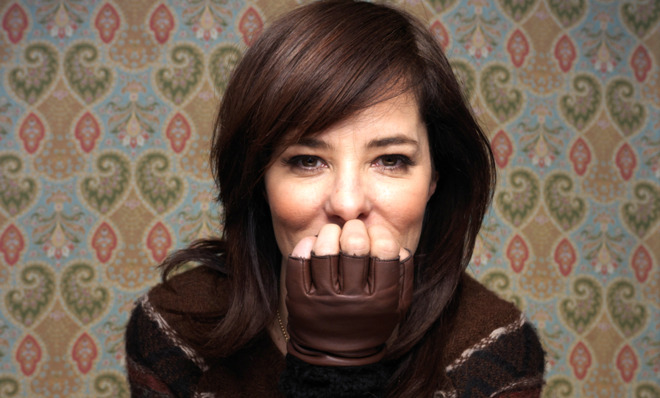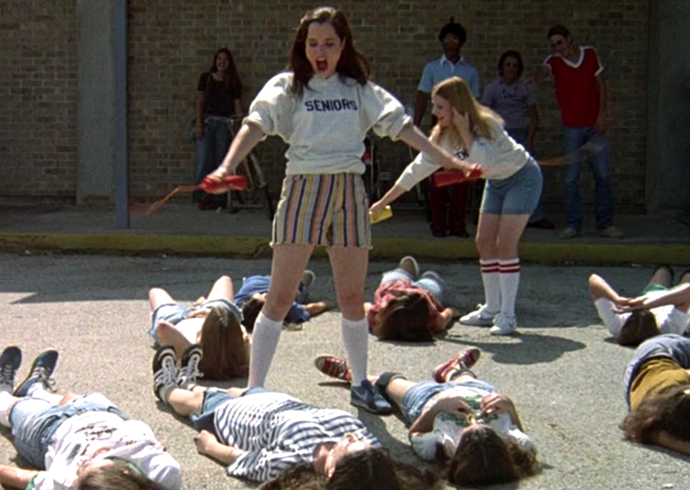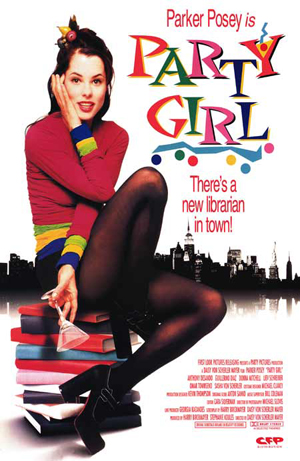Girls on Film: Parker Posey, powerhouse
On her 45th birthday, a tribute to the eclectic career of the woman once dubbed "Queen of the Indies"


A free daily email with the biggest news stories of the day – and the best features from TheWeek.com
You are now subscribed
Your newsletter sign-up was successful
Today, one of the most powerfully kick-ass women in cinema turns 45. She doesn't flit from film to film in skin-tight pleather, wreaking havoc and obliterating evil with movie magic-enhanced fists. She has never taken part in an epic space battle against gooey aliens, or faced a body builder-shaped time-traveling machine, or run across treetops brandishing a sword in a martial arts battle. Instead, she's full of innate human power — the kind cinematic tricks and CGI could never replicate.
She is Parker Posey.
Posey is cinema's constant reminder that strength isn't solely a matter of muscles and heroics. She can be blatant or subtle, creative or straightforward, nervous or assured.
The Week
Escape your echo chamber. Get the facts behind the news, plus analysis from multiple perspectives.

Sign up for The Week's Free Newsletters
From our morning news briefing to a weekly Good News Newsletter, get the best of The Week delivered directly to your inbox.
From our morning news briefing to a weekly Good News Newsletter, get the best of The Week delivered directly to your inbox.
At times, Posey's strength is obvious. It's Darla Marks, raising her hands in a "V" in Dazed and Confused, pledging to terrorize the latest crop of '70s freshmen. "You love us. Smile," Darla threatens. It's an act of bitchery toward her pledges, but also a rallying cry for the audience. She's the Mean Girl without the inferiority complex Hollywood often applies to its nastiest teens. Darla is simply secure in every way: Unphased by gossip, happy with her often questionable actions, and possessing the confidence to take over a room, or sidle up to the resident lech (Matthew McConaughey) for a squeeze. Darla created the mold for Posey's career playing strong and wildly diverse characters.

Over the next four years, Posey appeared in more than 15 indie films, and was eventually dubbed "Queen of the Indies" by Time in February 1997. The title would be applied to Posey over and over through the years, overlooking what the article said the title had cost her. Though the headline suggested the benefits of high cinematic society, the introduction revealed the personal price she paid to make films she believed in. Posey paid half her own airfare to play Rose McGowan's "eternal love slave" in The Doom Generation. When she accepted one of her most celebrated roles — Mary in Party Girl — she wasn't doing any better than her financially struggling character, making a mere $75 a day.
"Queen of the Indies" became a Catch-22 for the actress, who was caught between an appreciative audience and the realities of the business. "I didn't mind it at first," Posey later said about the title, "but since everyone always asks me about it, it's just something that puts me on the spot." The title was nothing more than a nice, yet insignificant, gold star for her career. "It hasn't really made it easier getting film work. [...] You really don't get paid in these independent movies, no matter how many people see them."
Unfortunately, the title was also a death knell of sorts as her meteoric indie rise hit a plateau. Mainstream work increased, with supporting gigs in You've Got Mail, The Sweetest Thing, Blade: Trinity, and Superman Returns — but independent film was dying, becoming what The New Republic aptly called "less an industry than a cultural signifier." Her indie firehose became a trickle, with the rare film like Dinner at Fred's, Best in Show, The Anniversary Party, or Broken English occasionally bubbling up through years of mainstream support and television gigs. It's a testament to Parker Posey's idiosyncratic superpowers that we continue to remember her as the "Queen of Indies."
A free daily email with the biggest news stories of the day – and the best features from TheWeek.com
At times, Parker is eminently relatable. As Miami in Kicking and Screaming, Posey is the girlfriend who quietly handles her boyfriend's myriad issues until she grabs the courage to express her sadness, with every word leading her to that tense, unflappable anger Posey's characters often possess. She sheds her vulnerability, embracing the bubbling feelings of control and power. "Ding that, Skippy. Get a f---ing life," she demands.
Other times, it's power that relishes in absurdity. As Jackie O in The House of Yes, she's the ultimate anti-heroine: In love with her twin brother, manipulating everyone who comes into her path while hopping back and forth between tense control and unbridled lunacy. Jackie is the picture of magnetic arrogance. Her words and actions make her anything but likable, but Posey's utter comfort and mania in the role are impossible to ignore — so seamless that she'd give any beloved antihero a run for his money.

There is no differentiation between the real and absurd in Posey's hand. As Sundance once described her technique, "offbeat" becomes a "life choice, rather than affect." So naturally, one of her most indelible roles — and the one that originally brought her to Sundance and set her path as the Indie Queen — is Party Girl. As Mary, Posey had to be both a willfully self-involved party girl unable to take anything but her own whims seriously, and a woman with an inherent organizational streak, who finds libraries the perfect tool for growing up and getting serious.
The film combined every persona-defining essence she already had and accentuated it. As Mary, Posey flings herself to and fro with theatrical excess, skittering about while also savoring every word with her trademark "beguiling southern vocal mannerism — less a drawl than a stretching of her vowels," as Silvia Killingsworth explained in her ode to Posey for The New Yorker. "Posey appears practically unconcerned with what her characters are saying, and wholly focused on how they're saying it."
That quality is what made Posey the perfect heroine for independent filmmaker Hal Hartley, who — after a number of short films and features — made her Fay Grim in the distinctive Henry Fool, and subsequent sequel, Fay Grim. His characters storm the set as if it were a stage. They accentuate and pause on words and body movements as if the mundane was Shakespearian, as a blue-collar garbage man (Simon Grim) becomes a Nobel Prize-winning poet under Henry Fool's guidance. Social mores are meaningless in Hartley's world, just as they are in Posey's.
At first, Posey plays the disenfranchised young woman stuck with sexual stigma, holed up in a house caring for her ill mother. But each absurd turn of the story gives Fay agency, as each push of hardship strengthens Fay rather than breaking her. She grows when she's given a purpose, and even when life begins to fall apart in Henry's absence, this suburban single mom easily becomes Fay Grim: International Spy by the second film, her messy hair smoothed as she figures her way through her fish-out-of-water assignment to find Henry's notebooks. Fay's fear makes her stronger, evoking a much more realistic "I don't know how she does it" than the abysmal Sarah Jessica Parker film where one woman "astonishingly" handles work and motherhood with the help of a nanny, husband, and personal assistant.
Hal Hartley is now Posey's cord to the old days, with Henry Fool and Fay Grim becoming two parts to a trilogy that will soon end with Ned Rifle — which Hartley just kicked off a Kickstarter campaign to fund. It's a kind of last hurrah, as the film hits the news just as preeminent independent filmmaker John Sayles says the indie movie business is dead.
But there's an ember waiting to be fanned. Films like Happy Tears and Price Check remind us of the wonderful strangeness Parker Posey once commanded. Now Fay Grim is set to return. Maybe when she blows out her candles today the ember will spark.
At the very least, the world can always use more of Posey's unforgettable improv with Christopher Guest (she once pitched him a new mockumentary about vaudeville and silent films — if only he'd bite!), or more of her idiosyncratic characters. We can only hope the independent world can hang on and survive, because no matter how many great turns she has on The Good Wife or Parks and Recreation, no gigs compare to the breadth of characters and consequences Parker Posey has faced in indies: Opportunities that reveal the truth outside the usual tedium.
Girls on Film is a weekly column focusing on women and cinema. It can be found at TheWeek.com every Friday morning. And be sure to follow the Girls on Film Twitter feed for additional femme-con.
Monika Bartyzel is a freelance writer and creator of Girls on Film, a weekly look at femme-centric film news and concerns, now appearing at TheWeek.com. Her work has been published on sites including The Atlantic, Movies.com, Moviefone, Collider, and the now-defunct Cinematical, where she was a lead writer and assignment editor.
-
 Palantir's growing influence in the British state
Palantir's growing influence in the British stateThe Explainer Despite winning a £240m MoD contract, the tech company’s links to Peter Mandelson and the UK’s over-reliance on US tech have caused widespread concern
-
 Quiz of The Week: 7 – 13 February
Quiz of The Week: 7 – 13 FebruaryQuiz Have you been paying attention to The Week’s news?
-
 Nordic combined: the Winter Olympics sport that bars women
Nordic combined: the Winter Olympics sport that bars womenIn The Spotlight Female athletes excluded from participation in demanding double-discipline events at Milano-Cortina
